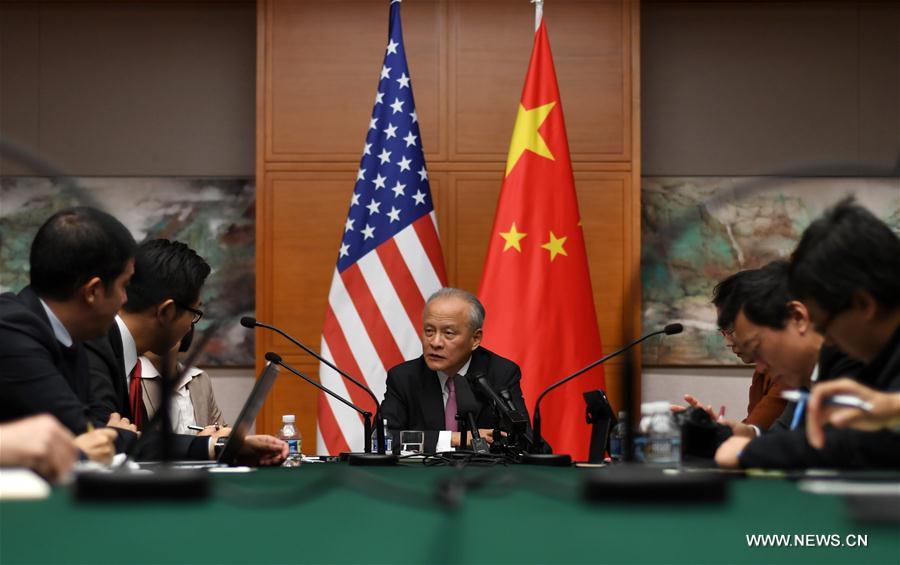
Cui Tiankai (C), Chinese ambassador to the United States, gives a press briefing at the Chinese embassy in Washington D.C., the United States, Oct. 30, 2017. U.S. President Donald Trump's upcoming visit to Beijing will be a great opportunity for China-U.S. relations, said Cui on Monday. (Xinhua/Yin Bogu)
WASHINGTON, Oct. 30 (Xinhua) -- U.S. President Donald Trump's upcoming visit to Beijing will be a great opportunity for China-U.S. relations, said Cui Tiankai, Chinese ambassador to the United States on Monday.
Cui made the remarks at a press briefing held at the Chinese embassy in Washington.
HISTORIC OPPORTUNITY
Trump is expected to visit China next month as part of his five-stop tour in Asia that will also take him to Japan, South Korea, Vietnam and the Philippines.
His tour to Beijing will make him the first visiting foreign head of state after the 19th National Congress of the Communist Party of China (CPC), Cui said.
The visit will be a great opportunity for China-U.S. relations, especially after the 19th CPC National Congress which reaffirmed that China will continue to follow the path of peaceful development, noticed the ambassador.
China will continue to seek the expansion and convergence of common interests with the rest of the world, and will continue to stand for better, closer, and more effective coordinations with other countries, especially the United States, said Cui.
President Trump will come to China at the very historic moment, and his visit will continue his strategic communications with Chinese President Xi Jinping on the basis of their earlier "very good dialogue", phone calls and a number of letters, Cui said.
"Our teams are working very closely for President Trump's state visit, and we hope it will be a successful and very productive visit," Cui said.
"STATE VISIT PLUS"
During the interview, Cui mentioned that China will be glad to provide an "state-visit-plus" experience for President Trump and his family.
"We have everything that is required for a state visit, for instance, the official talks, the guards of honor, the state banquet," said the veteran diplomat.
"But we want more than that," he added.
The ambassador said that there will be "some special arrangements" for the U.S. president and the first family to reciprocate the hospitality that Xi and his wife received during an April meeting in Trump's Mar-a-Lago estate in the U.S. state of Florida.
Cui also mentioned that during Trump's stay in China, the two presidents will be given sufficient time for the "top-level, strategic conversation," which is "extremely important for the development of bilateral relations."
Considered Trump's visit will cover five countries in Asia, Trump will have a very full schedule in Beijing.
"Hopefully he will come back for a second visit," seeing more China's cities, said Cui.
TRADE, KOREAN PENINSULA NUCLEAR ISSUE
Trade cooperation and the nuclear issue on the Korean Peninsula are among the key topics for Trump's discussions in Beijing.
Economic relations between China and the United States, the two largest economies in the world, have been and should continue to be mutually beneficial, said Cui.
As there is increasing economic interdependence between the two countries, "I think it is appropriate to say that there can only be win-win or lose-lose outcomes," Cui said.
The Chinese ambassador also expressed his confidence that there will be "significant outcomes" on the economic and trade front at the conclusion of Trump's China visit.
Speaking of nuclear issue on the Korean Peninsula, Cui said China has been doing everything it can on the issue, including enforcing all the sanctions on the Democratic People's Republic of Korea (DPRK) by the UN Security Council through a string of resolutions.
"Honestly, many of these sanctions will be implemented with a high cost on China itself, because we are DPRK's neighbor," Cui said.
But China is willing to take up the efforts as it believes in "the larger global interest" in the denuclearization of the Korea Peninsula, he added.
Meanwhile, Cui pointed out that the nuclear issue cannot be solved by China itself. "It requires joint efforts of all the parties concerned, including the United States and the DPRK," he said.
Noticing that the situation of the Korean Peninsula will be one of the priorities of dialogue between Xi and Trump, Cui hoped the the two sides could reach more agreements on it.



